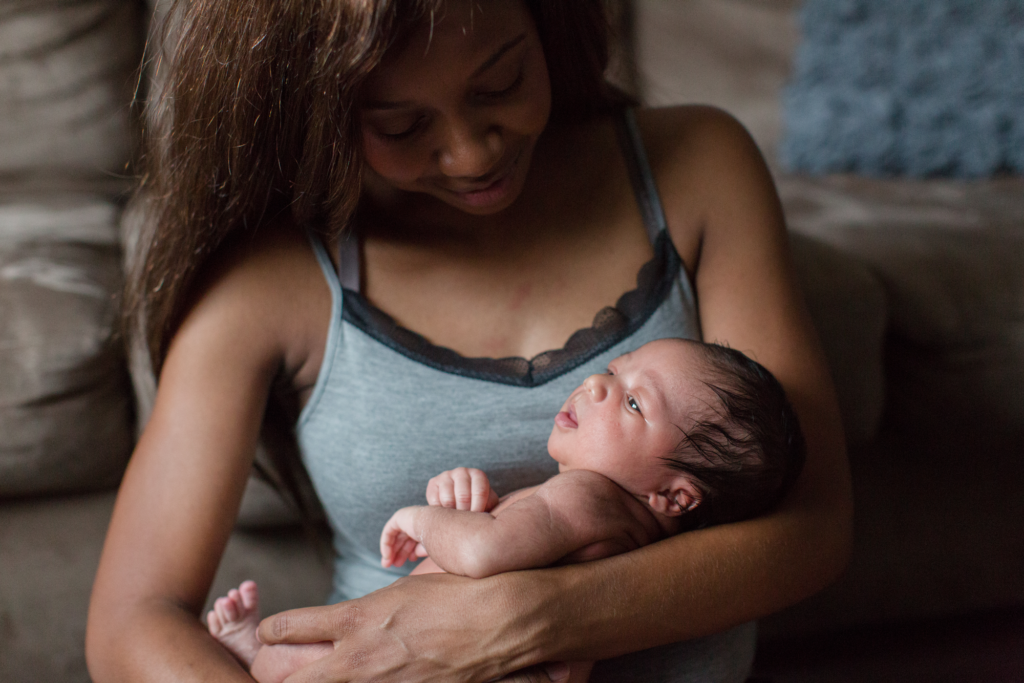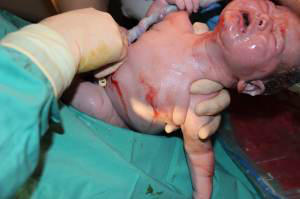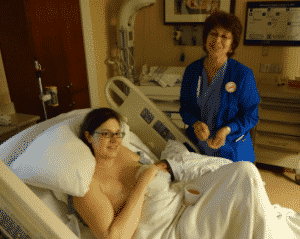After Delivery

What really happens after delivering a baby? First things first, when your baby is first born, the nurses will probably use a bulb syringe to clear out any mucus from her mouth and nose.
Once they feel like your baby is breathing well, they will cut the cord (or allow a family member to cut the cord, which can be a fun thing for dads/partners). A new(er) practice is to delay the clamping of the cord (called DCC), as many professionals now advise waiting until the cord quits pumping. Read more about delayed cord clamping.

If your baby is in good shape, they will probably hand him/her over right away. This is a special moment that will seem totally surreal. While you’re getting to know each other, a few things will happen — and you may not even notice ANY of it. You will deliver the placenta and all of the other *gook*, usually within 20 minutes or so. You may get an extra dose of pit (Pitocin) to encourage placental delivery. Your OB will also go ahead and stitch up your perineum (if required) and otherwise tend to your undercarriage. If you have an epidural, you will continue to be oblivious to any of this, which is faaaaaaabulous. This is a great time to inquire as to… the condition of things down thar. Ask your OB about the severity of any tearing, as they usually won’t mention it to you unless you ask.
Right after birth, your baby will be very alert and ready for his/her inaugural snack. Take advantage of this time to nurse your baby before he/she succumbs to the post-delivery hangover. Nursing during this time will release oxytocin, which does a great job of expelling the placenta and contracting the uterus. Don’t worry if you have no idea what to do, just do your best. The nurses can help you as well.

This heavy dose of oxytocin will also make you feel extremely and suddenly… sleeeeeepy. I remember fighting just to stay awake. Hand the baby over to your partner if you’re having trouble keeping your eyes open.
In the first hour, the L&D nurses will likely massage your fundus, which is the top of your uterus. This is just a belly massage that helps ensure that your uterus is clamping down, as it should, to slow the bleeding and to break up any clots. This can be a little painful if you’re not expecting it. During this time, you may also receive Pitocin through an IV, an injection in your leg, or a suppository if the bleeding is heavier than they would like. From there, nurses will be checkin’ up on that fundus every 2-3 hours or so. They do this to prevent bleeding complications, so be a sport about it. They put the ‘fun’ in fundus!
Also in that first hour or so? FOOD. You will be hungriest mother-effer this side of the Mississippi (whichever side you happen to be on). Here is where you get to order a dry turkey sandwich from the hospital menu. You won’t even care that the food is awful because at this point, you’re so hungry you could eat the placenta (sorry, I just threw up in my mouth).
A couple of hours after you deliver, you will likely be wheeled from L&D to a recovery room, unless your hospital has rooms that take care of both. If you had an epi, you still might not be able to feel your cold, lifeless, meat-like legs, so they may take you on a gurney to your new room. This is where you, your partner, and your baby will spend the next two nights (vaginal delivery) or four nights (C-section delivery), unless some shit really goes wrong, in which case you may stay longer.
After a few hours go by… and the painkillers are wearing off… you’re gonna be like – oww! What is this contraction-like sensation?
You thought you were done – ahahahaha! Those are called afterpains and they are no joke (for me, at least — some people don’t even notice them). Essentially, it is your uterus contracting down (which is good), but it hurts (which is bad). They are usually triggered by nursing, and they tend to be stronger with your second baby than your first. They should be gone by the 3rd day, but in the meantime you will need to manage the pain. (A heating pad can be your best friend during this time.)
After they remove your IV and you start to sober up a bit, the nurses will offer you Vicodin (every 4 hours) and ibuprofen (every 6 hours) to treat your pain. Take them up on this generous offer. Sometimes they forget so you have to remind them. You may also have some tenderness and pain in your hand from the IV, but it’s NBD. At this point, they will remove your catheter (if you had an epi) as well. Now you’re cordless, baby!
TMI Warning:
Be prepared to see more blood than you’ve ever seen in your life. Your bathroom floor will look like a murder scene from Psycho. You will feel sorry for the poor bastard who has to clean up after you. Sorry, janitors. I hope you get paid a LOT.
You will also be outfitted with the finest mesh underwear that healthcare has to offer. But wait, there’s more! Call right now and they’ll thrown in two gigantic maxi pads and a huge ice pack. This ice pack will become your best friend over the next two days. You should also know that you will have no bladder control whatsoever. Did I mention the giant maxi-pads? Verrrry handy. I asked them to keep my catheter in for a few hours so I wouldn’t have to get up. Lay-zeeeee, yup!